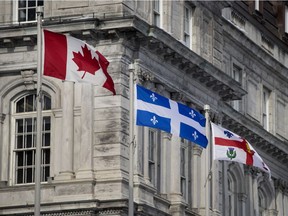For the first time, the number of people in Quebec whose first official language spoken is English has surpassed one million, according to the 2021 census.

.
More Quebecers speak French at home, but their share of the total provincial population is declining.
Announcement 2
.
For the first time, the number of people in Quebec whose first official spoken language is English exceeded one million, and their share of the population increased.
And English-French bilingualism is on the rise in Quebec, but declining outside the province.
Those are some of the findings from the 2021 census, the linguistic results of which were released by Statistics Canada on Wednesday morning.
The census measures the size, evolution and composition of language groups in Canada.
In addition to providing a detailed portrait of how Canadians communicate, the results are used by governments to administer the federal Official Languages Act and the French Language Charter.
Statistics Canada said the census found:
Announcement 3
.
- The number of people who spoke predominantly French at home rose from 6.4 million in 2016 to 6.5 million in 2021, but their share of the population fell from 79% to 77.5%.
- While the number of people in Quebec with French as their mother tongue increased between 2016 and 2021, their share of the Quebec population decreased from 77.1% to 74.8%.
- In most of Quebec’s 17 regions, French remained the first official language spoken by more than 90 percent of the population. However, the situation was different in Montérégie, Laval, on the island of Montreal and in the Nord-du-Québec region. In Montreal, for example, French was the first official language spoken by 58.4% of the population.
- For the first time in the census, the number of people in Quebec whose first official language spoken is English surpassed one million and their share of the population increased from 12 percent in 2016 to 13 percent in 2021. That’s about the same level than in 1981. Statistics Canada derives the first official language figures based on questions about knowledge of official languages, language most often spoken at home, and mother tongue.
- Seven out of 10 English speakers lived on the island of Montreal or in Montérégie.
- From 2016 to 2021, the proportion of Quebec’s population whose only mother tongue is English remained relatively stable (from 7.5% in 2016 to 7.6% in 2021), but the number of speakers increased by 38,000, up to 639,000. Taking into account all Quebecers with English as their only mother tongue or together with another language, the gain is much higher (an increase of 125,000). This is due to an increase in the number of people who reported that both English and French were their mother tongues.
- Nearly one in five people in Quebec (19.2 percent) spoke English at home at least regularly, more than half of whom spoke it together with French, another language, or French and another language.
- The number of people who spoke predominantly English at home (874,000 in 2021) represented 10.4% of the Quebec population, up from 9.7% in 2016.
Announcement 4
.
“Several factors explain the increase in the relative proportion of English speakers in Quebec, including the English-speaking population being younger on average (and thus having proportionately fewer deaths) and specific recent migration trends,” Statistics said. Canada.
“Other data sources indicate that the number of non-permanent residents has increased considerably in Quebec since 2016 and that the province’s net interprovincial migration, while still deficient, has improved in the recent period. Historically, English-speaking populations are overrepresented in Quebec’s interprovincial migratory movements.
Among other findings:
- In 2021, Canada’s English-French bilingualism rate was 18%, compared to its previous high in 2016 (17.9%).
- Meanwhile, in Quebec, the proportion of English-French bilinguals increased to 46.4%, from 44.5% in 2016. The English-French bilingualism rate has been rising steadily in Quebec for decades. It was 25.5 percent in 1961.
- In Quebec, nearly one in two people with a non-official mother tongue (47.9%) spoke French at home at least regularly in 2021, while 37.5% spoke English.
- From 2016 to 2021, the proportion of people with an unofficial mother tongue living in Quebec who spoke predominantly French at home increased slightly (from 18.8% to 20.1%), while the proportion speaking predominantly English at home remained relatively stable during the period.
- Canada’s linguistic diversity continues to grow. Immigration increased the number of Canadians who predominantly spoke a language other than English or French at home, from 4 million in 2016 to 4.6 million in 2021. English was the first official language spoken by 75.5 percent of the population, compared to 74.8 percent. in 2016, while French was the first official language spoken by 21.4% of Canadians in 2021, up from 22.2% in 2016.
ad 5
.
The latest census figures will provide political material in Quebec’s general election on October 3, which is expected to be formally called at the end of the month.
Always a subject of intense debate in Quebec, the language issue is under scrutiny due to Prime Minister François Legault’s bill 96. Adopted in May, it was the biggest overhaul of Quebec’s language rules since the advent of Bill 101, the Charter of the French Language. , in 1977.
Bill 96 further restricts the use of English in Quebec in an attempt to boost the French language.
Anglophone rights groups describe the law as draconian and point to far-reaching changes that could affect many aspects of daily life, from health care to the operation of businesses to the functioning of the judicial system.
Legault’s Coalition Avenir Québec government says the new measures are long overdue, arguing that French is in decline in Quebec, both in the workplace and in the home.
This story will be updated.
-
Analysis: Quebec parties in prep mode as election call nears
-
This is how opponents will use the courts to try to thwart Quebec’s Bill 96



